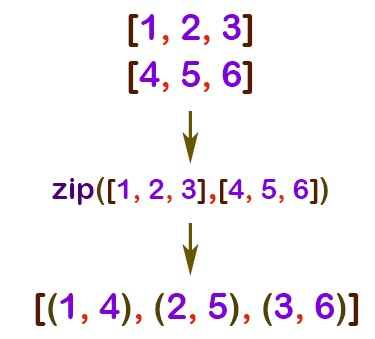The zip function in Python 3 takes two parameters, and generate an iterator that contains tuples. Each tuple takes a value from each input – which can be tuples or arrays. It can be illustrated as follows:
Python3 zipping two tuples
In Python2, the zip function will return all the zipped-elements in an array while in Python3, the zip function will returns an iterator – saving memory. For example,
1 2 3 4 | a = (1, 2, 3) b = (4, 5, 6) zip(a, b) # <zip object at 0x7ff81cb770c8> list(zip(a, b)) # [(1, 4), (2, 5), (3, 6)] |
a = (1, 2, 3) b = (4, 5, 6) zip(a, b) # <zip object at 0x7ff81cb770c8> list(zip(a, b)) # [(1, 4), (2, 5), (3, 6)]
As you can see in this example, the source inputs can be tuples as well. You can mix-and-match and the result is always an iterator. Then you can easily convert the iterator to array using list() or to set using the set().
zipping takes minimal length
If both inputs are of different sizes, the zip function will only zip the minimal length of both. For example,
1 2 3 4 | a = (1, 2, 3, 4) b = (4, 5, 6) zip(a, b) # <zip object at 0x7abcdcb770c8> set(zip(a, b)) # {(1, 4), (2, 5), (3, 6)} |
a = (1, 2, 3, 4)
b = (4, 5, 6)
zip(a, b) # <zip object at 0x7abcdcb770c8>
set(zip(a, b)) # {(1, 4), (2, 5), (3, 6)}zip nested elements
The zip function can take nested inputs as well, for example:
1 2 3 | a=[(1,2),(3,4)] b=[(5,6),(7,8)] list(zip(a,b)) # produces [((1, 2), (5, 6)), ((3, 4), (7, 8))] |
a=[(1,2),(3,4)] b=[(5,6),(7,8)] list(zip(a,b)) # produces [((1, 2), (5, 6)), ((3, 4), (7, 8))]
You can use the zip() function to achieve something similar of what the enumerate() does in Python.
Hey, we also have zip_longest from itertools which allows to zip according to the longest: Python’s zip_longest Function
You can also implement the zip_longest and zip function in Python: Teaching Kids Programming – Introduction and Re-implement the zip and zip_longest Function in Python
–EOF (The Ultimate Computing & Technology Blog) —
loading...
Last Post: Passengers Pick-up and Drop-off Algorithms (Car Pooling) via Greedy Algorithm
Next Post: Using Greedy Algorithm to Fix the Broken Calculator
